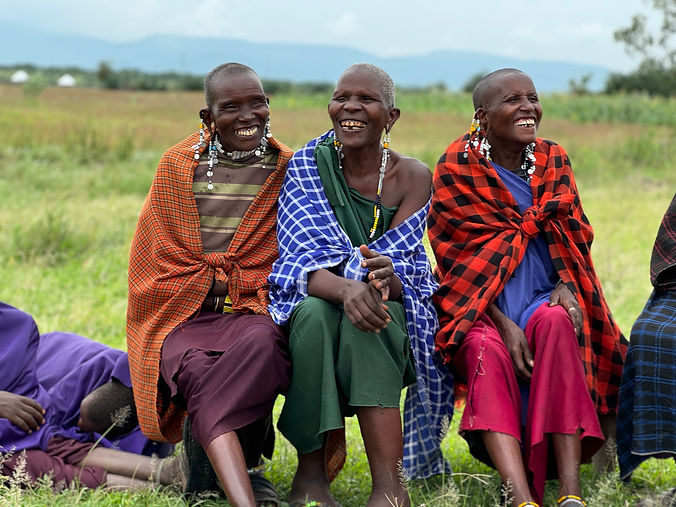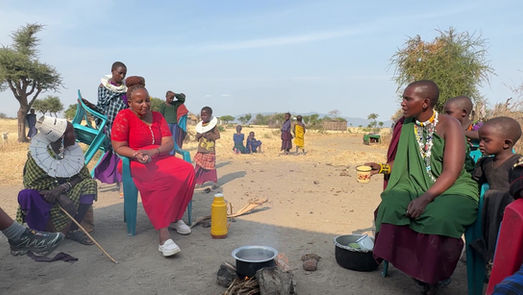
Tanzania
Since 2018, Wombs of the World has been working in the Karatu region of northern Tanzania — building long-term relationships with hospitals, clinics, and communities.
Today, the WotW Foundation is dedicated to supporting community-led initiatives that strengthen maternal healthcare, honor traditional midwifery, and create lasting impact for mothers and families.
MATERNAL HEALTH IN TANZANIA:
KEY CHALLENGES AND SOLUTIONS
Maternal Mortality: As of 2019, Tanzania faces a high maternal mortality ratio of 556 deaths per 100,000 live births.
Global Context: The World Health Organization notes that 70% of global maternal deaths occur in Sub-Saharan Africa, with Tanzania being significantly impacted.
Geographical Challenges: The vast and rural geography of Tanzania makes accessing healthcare facilities difficult. Many expecting mothers must travel long distances for care, leading to delays and increased risk of complications.
Healthcare Facility Limitations: Even when care is reached timely, facilities often lack the necessary medical equipment, supplies, and infrastructure for emergency obstetric care.
Strategies for Improvement:
-
Infrastructure Investment: Enhance healthcare infrastructure to support emergency obstetric care effectively.
-
Professional Training: Invest in the training of healthcare professionals to improve the quality of maternal care.
-
Transportation Improvements: Develop better transportation systems to facilitate quicker access to healthcare facilities.
-
Prenatal Care Services: Strengthen prenatal care services to ensure expecting mothers receive consistent, quality care throughout their pregnancy.
-
Community Education: Promote education and awareness about the importance of maternal healthcare to encourage early and regular care- seeking behaviors.
Impact Timeline
CURRENT PROJECT:
The Karatu Gentle Birth Initiative
In 2026, the Wombs of the World Foundation will launch the Karatu Gentle Birth Initiative at Karatu Lutheran This pilot program introduces a vertical birth room, doula-informed staff training, and maternal care protocols rooted in dignity and respect.
By combining ancestral traditions with evidence-based medicine, we aim to create a replicable model for safer, more compassionate births across East Africa.


"Every month, we see women and families whose lives are forever changed by the kind of care they receive—or don't. The difference between joy and tragedy often comes down to the presence of skilled and compassionate care during childbirth. This isn't just about numbers; it's about real lives, hopes, and the future of our communities."
Dr Heriel, Director of Karatu District Hospital, Tanzania
Since 2020, we’ve also partnered with a Maasai community rooted in traditional midwifery practices. What began as women inviting us to sit in circle has grown into a deep, trusting relationship.
Their requests have always been modest: funding a bead collective, goats, mattresses for children at boarding school, even a community toilet. Each time, the resources have flowed directly back into the families.
In 2024, their biggest request yet emerged: a primary school. Until then, the nearest school was over 10 miles away. With grassroots fundraising, and doulas who carried the story home, we raised $10,000 to build a school on their land. The building is nearly complete — a living symbol of resilience, leadership, and possibility for the next generation.
This is what community-led initiatives look like: small, intentional investments rippling into lasting change.
Looking Ahead
Our vision in Tanzania is to continue strengthening maternal health through a blend of:
-
The Karatu Gentle Birth Initiative: building a vertical birth space, maternal showers, and doula-informed protocols at Lutheran Hospital.
-
The Clinical Immersion Program: bringing skilled OBGYNs, midwives, and L&D nurses into exchange with Tanzanian staff, modeling evidence-based care and expanding training in critical areas like infant resuscitation and shoulder dystocia.
-
Community-Led Projects: supporting Maasai midwives, families, and schools in ways that are defined by their own voices and needs.
This work is just beginning, and your support makes it possible.



























